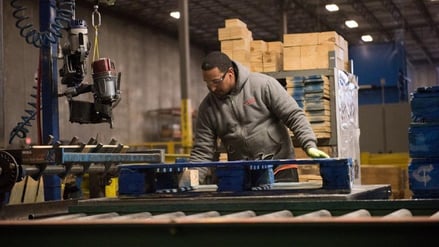With high school graduation around the corner, many students may be wondering the overwhelming but inevitable question: What's next?
For many, college will be their next stop, but there are far fewer resources available for those graduating students ready to start working and begin their careers right after high school. Wondering what you can do with your new diploma besides apply for higher education? The options in the packaging world are vast and ripe with growth of opportunities.
Our pallet repair specialists are the backbone of the company. Without the strong men and women that handle production, manufacturing and transportation, Millwood would cease to exist. These valuable team members are becoming harder to find, however, as society places more and more value on the white collar jobs that rely on these blue collar workers.
Society's push over the last decades to get all young people into four-year colleges has resulted in a shortage of skilled workers. High schools across the nation have dropped vocational and technical education programs, which in turn is preventing our young people from being introduced to these careers. Now USA manufacturing has realized their need for vocational and technical education, and so the future predicts the fastest growth in our economic job markets are the middle-skill jobs. These jobs require some training, but far less school than a bachelor's degree.
What is a Middle-Skill Job?
The outdated stereotype of a middle-skill employee is the person carrying a metal lunch bucket to work where they would spend long hours doing the same mindless, repetitive task (more than likely on a production line).

However, today’s middle-skill job worker is more likely to be trained in computer skills, lean manufacturing or quality tracking. They can operate a variety of complex equipment, rise to management positions, make quality decisions and even deal directly with customers!
Whether you prefer warehousing, oil and gas, manufacturing, firefighting, construction, carpentry or the careers who build the infrastructure like electricians and pipefitters, recent significant changes to these positions make them more like a career of semi-professionals rather than unskilled workers.
For one thing, the level of required problem solving is considerably higher than ever before. Decision making is often passed down from manager to operator; work teams make their own decisions and often determine best work processes. Improvement suggestions are expected and often times these employees interface with customers and quality may be measured. These job requirements means that entry-level middle-skill jobs applicant quality has to increase as well.
If you are interviewing for a middle-skill job today more than likely you will be asked behavioral based interviewing questions designed to help companies understand how you may perform in their job based on past experiences.
Questions during an interview would more than likely be around competencies such as:
- Ability to learn
- Problem solving
- Planning work
- Mechanical ability
- Basic Math skills
- Teamwork
- Initiative
- Communication
- Safety
- Quality focus
Since these jobs pay on average $15 per hour and up with full benefits, room for advancement (more money) and paid training, it is important to be interview ready. In my next guest post, I will discuss the dos and donts to preparing for an interview that will get you hired!
.jpg?width=100&name=Sapphire%20Wells_100x150(2).jpg)
Sapphire Young is the manager of HR support services at Millwood. Her experience in hiring, interviewing and managing the recruitment process makes her a valuable resource for anyone interested in developing their career, be it in an office or a pallet facility. This blog was written by her with a combination of her expertise and resources from The Economic Policy Institute and SHRM.






